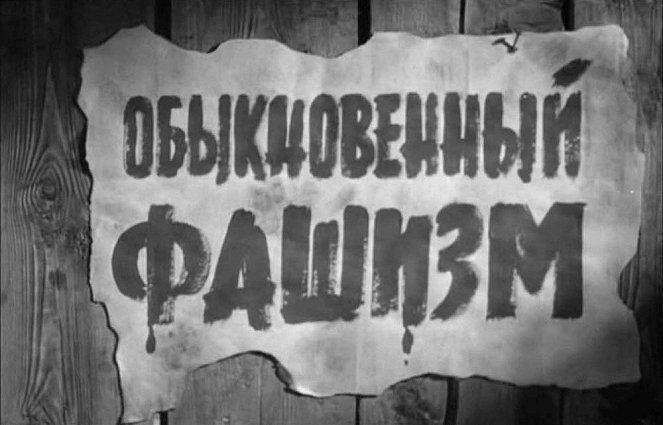Regie:
Mikhail RommDrehbuch:
Mikhail RommKamera:
German LavrovBesetzung:
Mikhail Romm (Erzähler), Marlene Dietrich (Arch.), Joseph Goebbels (Arch.), Hermann Göring (Arch.), Adolf Hitler (Arch.) (mehr)Inhalte(1)
Der Dokumentarfilm gilt als Meilenstein der Filmpublizistik. Der russische Regisseur Michail Romm versucht anhand von historischem Bildmaterial aus der Zeit des Nazi-Regimes am Phänomen des Faschismus das unmenschliche Antlitz sichtbar zu machen und den Mechanismus des Betruges an Millionen von Menschen aufzudecken. Er analysiert die Wurzeln des Faschismus und dessen verhängnisvollen Einfluss auf die menschliche Psyche. (Verleiher-Text)
(mehr)Kritiken (2)
Der gewöhnliche Faschismus ist jedes Jahr wieder eine immer stärker stinkende Ironisierung von Themen, die nicht den arroganten Kontext der Zeitlosigkeit der 1960er Jahre brauchen, um aktueller zu sein. Was lustig sein sollte, ist peinlich, was lehrreich sein sollte, ist einfach nur naiv. Im Original ist Romm zwar nicht ganz so jovial, aber sein damaliger Appell resoniert heute einfach nicht mehr.
()
Local intellectuals and historians, of course, in 80% of cases, do not comment on the film, but rather express their opinions on the nature of regimes and states, totalitarianism, etc. I did not want to, but I have to ask three questions to everyone who thinks that the USSR and Nazi Germany were the same: 1) How is it possible that a totalitarian regime could perfectly capture the essence of Nazi dictatorship when it would be exposing itself? In that case, the USSR would destabilize itself in front of the eyes of its citizens = viewers, which would put it in a peculiar contradiction, because as a proper totalitarian regime, it should eliminate any signs of its own degradation, imperfection, etc. and eliminate its critics, who would essentially become M. Romm. And not to make that movie at Mosfilm! /// 2) Related to the first question: When I criticize another person for their bad behavior and behave the same way myself, I cannot accurately and insightfully uncover the reasons for the badness of their behavior from a psychological or any other perspective. In other words, how is it possible that the USSR accurately described Nazism when it was to have behaved the same way and the true causes of its own behavior should have been hidden from it, as objective assessment is only capable of by a non-totalitarian consciousness? /// 3) This film is precisely an example that the USSR was capable of self-reflection: after all, criticism of Stalin's cult could not be avoided due to the description of Mussolini/Hitler, and yet it is captured very suggestively in the film, even though it must have been clear that every Russian would recognize it just 12 years after Stalin's death! How is it then possible that totalitarianism changes and criticizes itself when it is supposed to be all-powerful and unchanging, as it is, after all, totalitarian and controls everything and everyone and therefore has no reason to change?
()
Galerie (6)
Photo © Moscow International Film Festival


Werbung